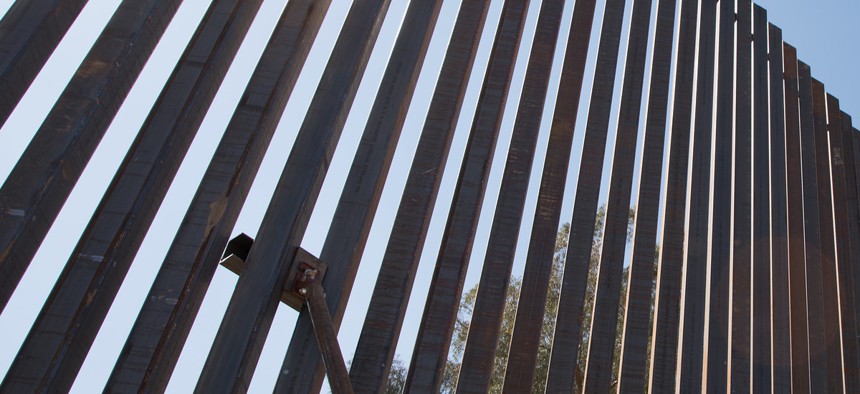
Mani Albrecht/CBP file photo
South Texas Landowners Are Hoping to Use President Trump's Own Words Against Him in a New Border Wall Lawsuit
Landowners are alleging that the construction of the barrier is driven by little more than racism and politics and is therefore unconstitutional, according to a new lawsuit.
Landowners in South Texas are launching another front in their battle against President Donald Trump’s efforts to build a wall on the Texas-Mexico border. And this time, they’re using the president’s own words against him.
In a federal lawsuit filed Monday in Laredo, Zapata County and two border landowners are alleging that the construction of the barrier is driven by little more than racism and politics and is therefore unconstitutional.
“The action of the government is based on animus toward a group, and that’s unconstitutional. You can’t make policy in governmental action based on animus toward a group,” said attorney Carlos Flores. "This is something that hasn’t really been brought up before" as a tool to fight the wall, Flores said.
Flores filed suit on behalf of Zapata County; Laredoan Melissa Cigarroa, who owns an interest in more than 170 acres of land in Zapata County; and Zapata County resident George C. Rincon. It names Trump, acting Department of Homeland Security Secretary Chad Wolf, and acting Customs and Border Protection Commissioner Mark Morgan as defendants.
The Department of Homeland Security did not respond to a request for comment Tuesday afternoon.
The lawsuit challenges the 2017 executive order that Trump issued just days after taking office that mandates construction of a physical barrier on the border, and a series of environmental waivers issued in May that were intended to fast-track almost 70 miles of barrier from Webb County to Zapata County.
In issuing both directives, the lawsuit claims the administration violated the Fifth Amendment’s due process clause, which provides for equal protection under the law. “Executive Order Number 13767 creates a 2nd Class United States citizen at the southern border who can have their land seized wholesale based on racist and white nationalist motives,” the lawsuit states.
Flores said that the administration has to show that it has “a narrowly tailored compelling governmental interest” to justify constructing the border wall. He said the plaintiffs will argue that the government’s only compelling interest is Trump’s reelection.
“We think there is a lot of evidence that’s going to show that,” he said.
Even before he took office in 2017, Trump used divisive rhetoric to make the case for a “big, beautiful wall” on the southern border. The lawsuit contains a timeline with some of the president’s most controversial statements on race and the border, including some that predate his 2015 press conference announcing his candidacy in which he described some Mexicans as criminals and rapists. They include a tweet in 2013 stating “the overwhelming amount of violent crime in our major cities is committed by blacks and Hispanics — a tough subject — must be discussed.”
Several statements the president made via Twitter after taking office that portray the border area as a hotbed of crime and violence are also included in the timeline, as are comments by the CBP’s Morgan about “so-called” minors in immigration detention that he described as soon-to-be MS-13 gang members — a reference to the notorious Salvadoran prison gang that formed decades ago in U.S. prisons.
The lawsuit also argues that a border wall would hurt recreation and public safety. “Fishing, hiking and recreation will all be affected. Zapata County’s fire, police and ambulance services will also be affected, as they may not be able to respond to emergencies on the river side of the wall,” the complaint states. “DHS/CBP is effectively commandeering these local resources as part of their wall construction. This undermines political accountability.”
Flores is also representing Zapata County in a separate lawsuit filed in May that involves a 4-acre tract of land in San Ygnacio, a small community about 35 miles south of Laredo. The county is trying to stop DHS officials from surveying the land for possible border construction. A pretrial conference in that litigation is scheduled for August.
That lawsuit came after the administration moved ahead with construction of new barriers in the Rio Grande Valley and later issued notices to landowners in Webb County telling them that federal officials were moving ahead with surveys on private land.
After the lawsuit was filed, opponents of the border wall drove by the federal courthouse in Laredo on Tuesday morning, waiving signs and honking car horns to show their support for the latest effort while practicing social distancing. Dozens of shoes, boots and sneakers were set up in front of the building to represent Tejanos who couldn’t be there in person because of the new coronavirus pandemic, said Tricia Cortez, executive director of Rio Grande International Study Center.
“There will be more actions. We need you,” Cortez posted on Facebook. “Join us. This is about the future of our land, our river, our wildlife, our homes, our neighborhoods, our ranches, our parks, our nature trails, our property rights, our constitutional rights, and our rightful place as American citizens in this country.”
This article originally appeared in The Texas Tribune at https://www.texastribune.org/2020/07/07/texas-landowners-trump-border-wall-lawsuit/. The Texas Tribune is proud to celebrate 10 years of exceptional journalism for an exceptional state. Explore the next 10 years with us.






